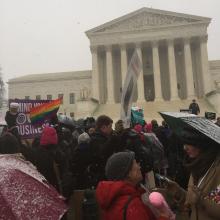Hobby Lobby v. Sebelius
Today, the Supreme Court heard two cases that have major implications for the intersection of religious liberty and health care in America. While Sebelius v. Hobby Lobby Stores and Conestoga Wood Specialties Corp. v. Sebelius were argued before the Court, hundreds of activists voiced their opinions outside the Court’s chambers.
The Court will decide whom the so-called “contraception mandate” law in the Affordable Care Act applies to. Both of the challengers to this section of the 2010 health law say that providing certain forms of birth control violates their sincerely held religious views. Though there are already exemptions in law for churches and some nonprofits, this case will decide whether for-profit corporations are offered protection under the religious liberty clause of the First Amendment to deny contraception coverage to their employees.
As we near the March 25 arguments in Hobby Lobby v. Sebelius, it can feel as though men have the monopoly on religious activism in America. After all, 38 protestant theologians signed on to an amicus brief suggesting that a business owner’s religious beliefs should dictate the consciences and actions of female employees – none of those theologians were women.
A glance at the past, present, and future of women’s leadership in American religious life, however, shows this simply is not true. Today, as throughout American history, women have fought for their voice in religion, the opportunity to express their faith, and to obtain the same access to religious leadership as their brothers. Just as in other areas of work and life, creating opportunities for women to increase their hand in religious leadership is vital to greater equality and new perspectives in theology, moral activism, and spirituality.
Despite the increase in women in clergy careers over the last 40 years, it has been an uphill battle for women who have changed hearts, minds, and traditions for career opportunities as clergy and religious leaders in churches, synagogues, and mosques. Issues around the “ stained glass ceiling” in clergy careers can range from discouraging congregants who are biased against women clergy to institutional inequalities: men still outnumber women in clergy positions in America, and, according to the Bureau of Labor Statistics, only 20.5 percent of self-described clergy were women in 2012. In certain religious traditions — the Roman Catholic Church, the Church of Jesus Christ of Latter Day Saints, the Orthodox Church, and Orthodox Judaism, for example — women cannot be ordained as clergy or prayer leaders. It is also very rare to find Muslim women leading mixed-gender services.
